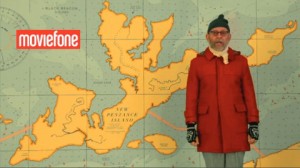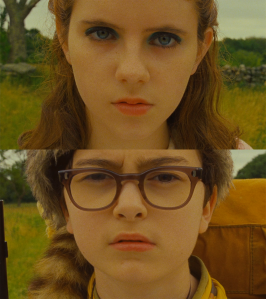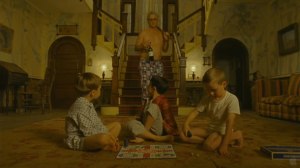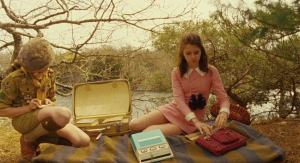‘Moonrise Kingdom’ (Review)
Real life can at times be a challenge to cope with. It can be boring, sad or hurtful, which is why all Wes Anderson’s films represent a fairytale, as he tries to provide viewers with a way of escaping the real world. His unique style may not suit everyone’s taste, but those who can get lost and find pleasure in the universe he creates, will find his ‘bizarreness’ truly fascinating.
Anderson usually leaves the modern world behind, as he loves creating his own one from scratch. Taking us back to 1965, ‘Moonrise Kingdom’ is therefore no exception. We are being introduced to the island of New Penzance by a quirky looking man, who informs us of it being “famous for the ferocious and well documented storm which will strike from the East on the 5th of September, in three days’ time.” Oddly enough, we’re being told about an event about to happen that has already taken place, a sign we’re definitely in one of Anderson’s bizarre creations.
Suzy (Kara Hayward) and Sam (Jared Gilman), the main characters, are two unpopular and misfit kids, extremely smart for their age, who fall in love with each other. Suzy lives with her parents and siblings in an extremely quirky house, the type of picturesque setting you would only see in paintings or postcards. The opening scenes illustrate Suzy’s three brothers playing, eating, and keeping themselves busy, and you can easily tell, from the very beginning, this isn’t the depiction of a typical family.
From the music they voluntarily listen to (Britten’s ‘The Young Person’s Guide to Orchestra’), the way they play and eat, to the pastimes their parents are separately involved in (while still being in the same house), are all elements that suggest the presence of one of Anderson’s prevalent themes, that of a dysfunctional family. The same theme is also reflected by Sam’s condition, an orphan who is part of a local scout troop. Interesting to note though, Scout Master Ward (Edward Norton) only finds out about that when he calls what he thought to be his real parents to let them know Sam had run away from the camp. Even a simple fact like that says something about his place within the group of people around him. Furthermore, relevant to how Sam’s character is depicted is the question one of the scouts asks after being told they would have to go on the mission of finding him: “What if he resists? (…) Are we allowed to use force on him?” The disappointment on their face when the answer is negative is more suggestive of their relationship than any direct statement.
Characteristic of Anderson’s narrative is the nonlinear aspect of scenes and the lack of chronology in their unfolding. It is thus only after Sam and Suzy meet at the arranged time and place of their elopement that we are being introduced to the circumstances of their first encounter, the backstage of a play that Suzy takes part in. The moment Sam sets his eyes on Suzy for the first time is an instant of a pure and simple charm that only Anderson could have managed to create so gracefully. It is the chemistry between two young adolescents who are almost unanchored from their childhood but not yet experiencing adulthood, which is exactly what makes the connection between them so unique. His way of approaching Suzy is of a charming bluntness, which fascinates her and stirs her curiosity:
Sam: “What kind of bird are you? (…)”
Girl: “I’m a raven, she’s a…”
Sam: No, I said what kind of bird are YOU?”
Suzy: “I’m a raven.”
(…)
Sam: “What happened to your hand?”
Suzy: “I got hit by a mirror.”
Sam: “How did that happen?”
Suzy: “I lost my temper at myself.”
The summer after their first encounter, after an extensive and detailed planning, they secretly meet and run together. Back at Suzy’s house, her parents realize she is missing, find out about her plans to run away with Sam after discovering all the letters they had been sending each other over the year and thus start tracking them.
The time Sam and Suzy spend camping together represents not only an opportunity for them to get to know each other better, but also a self discovery journey, both for the characters, as well as for the viewers. The moment Sam writes down everything Suzy brought with her (for the purpose of an ‘inventory’), is symbolic for learning about her past, family connections and her character, as every item she carries in her bag represents a little strand that ties back to her life. For instance, her favorite music record is a French one, a gift from her godmother who lives in France. I believe this specific aspect to be exemplifying the ‘impaired’ relationship she has with her parents (and in particular, mother), as most girls would have chosen as a favorite object something their mother had given them. Furthermore, the fact that she likes “books with magic power in them” symbolizes her need of escaping a reality that does her free spirit no good, a cruel reality in which she finds her parents reading books like “Coping with the very troubled child”.
The two kids are hunt down by an entire army of people and separated. However, felling guilty for the way they had treated Sam, the scouts decide it is their moral obligation to give him a hand and thus help him reunite with Suzy. As the predicted storm is approaching, Sam, Suzy and the entire troop is being chased by everyone. The two manage to hide in the storm rescue headquarters, but they are quickly spotted. They run to the roof and plan to jump into the storm’s violent flood, but in the end they agree not to. Before going back safely though, the building gets hit by a lightning and the two kids are left hanging from the roof. They do, however, manage to survive by holding on to each other.
Suzy gets back home safely, where Sam, most probably in secret, visits her daily. The final frame of the film illustrates a painting that Sam made for Suzy, representing the bay where they spent most of their adventure and where he spelled with stones in sand two words: Moonrise Kingdom.
Although the only characters I mentioned details about were Sam and Suzy, I believe Donohue (2012) manages to express perfectly another strong feeling that the film transmits. It is the idea that the film is not just about kids at an age of transition, but also about their parents and the development of their relationship: “The scene between the mother and the daughter where the daughter is in the tub, and the scene with the mother and father in bed-those scenes give the film its sense of maturity.” Francesca McDormand as Laura Bishop, along with Bill Murray as Walt Bishop, make you question everything you’ve ever known or experienced about marriage and parenthood. As a child, it must stir a certain curiosity and make you wonder about your parents’ struggles, about their love, about all the years they’ve spent together and how this has moulded their personalities. In a similar manner, as a parent or spouse, they probably make you ask yourself endless questions about the way you’ve been raising your children, whether it’s because of some mistakes you had done that they’ve developed certain characteristics, whether you could or not have made them grow closer to you and if there’s anything that might have made you grow apart from your wife or husband or is about to.
‘Moonrise Kingdom’, as well as Wes Anderson’s films in general, represents the most complex kind of escape from reality. What he skillfully manages to create is a type of journey where you discover not only a truly unique universe and the inside world of the characters he populates it with, but also a version of yourself. You lose sight of your own persona when the characters’ feelings intensify, but you quickly rediscover yourself as soon as they are dealing with a situation you can easily relate to. You laugh out loud one second, almost cry the next one, reflect intensively upon your life for the following five minutes and admire with pure fascination his artistically crafted universe for another ten. I would have never imagined that watching the world and love unfold through the eyes of two kids can be so captivating and engaging. In a society where every aspect of life is drenched in political connotations, ‘Moonrise Kingdom’ represents a truly invigorating breath of fresh air.
BIBLIOGRAPHY:
IMDb. 2012. Moonrise Kingdom. [online]. IMDb. Available from: http://www.imdb.co.uk/title/tt1748122/ [Accessed 5 April 2013].
Donohue, W. 2012. Love on the Run. [online]. Filmmaker Magazine. Available from: http://filmmakermagazine.com/53944-love-on-the-run/ [Accessed 7 April 2013].








[…] ‘Moonrise Kingdom’ (Review) (andragroza2013.wordpress.com) […]
Film Review: Moonrise Kingdom | One Eyebrow Raised said this on April 17, 2013 at 7:02 pm |